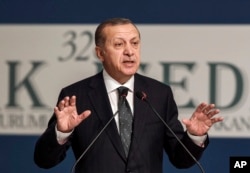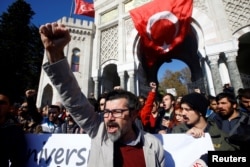Turkish President Recep Tayyip Erdogan warned the European Union on Friday that if it continued to threaten his country, he would allow hundreds of thousands of migrants to flood into EU countries.
The European Parliament, in a largely symbolic vote Thursday, demanded the bloc freeze membership negotiations with Turkey over the government’s heavy-handed crackdown following the failed military coup in July.
Warning: Gates to open
Erdogan, reacting with trademark anger Friday, warned that if it went any further, Turkey's border gates would be opened, calling the EU vote an "empty threat."
“When 50,000 immigrants reached [the border town] of Kapikule, you wailed. ‘What would we do if Turkey opened the border gates?,’ you’ve pondered. Look here, if this goes any further, those border gates will be opened — you should know that. Neither I nor this nation cares about empty threats,” Erdogan said, while speaking at a congress on women’s justice in Istanbul.
Analysts say Ankara believes it holds a trump card in threatening to break off the deal. Under the March agreement, Turkey agreed to take back all migrants crossing illegally to Europe, in return for over $3 billion in aid and the speeding up of EU membership talks.
But that threat is losing its potency, says Turkey analyst Kamran Matin of the University of Sussex.
"Because by now most European countries have actually set in place certain frameworks and practices in relation to the migration, so I don't think that will be an immediate problem,” Matin said.
Freeze would be symbolic
Members of the European Parliament voted 479 to 37 in favor of a nonbinding motion urging the European Commission and national governments to institute what lawmakers acknowledge would be a largely symbolic freeze in negotiations that have been going on for 11 years but have long been stalled.
Neither side expects Turkey to be in a position to join the EU for many years to come.
"[EU members] are unhappy with what is going on in Turkey,” Matin said, “but they don't want to be the party which initiates the suspension of the talks because that, they think, is what Erdogan is looking for, in order to tell Turkish people that ‘it wasn't us, they actually ended the accession talks.’ "
But the European Union has been increasingly vocal in condemning Turkey's crackdown following July's failed coup. Over 110,000 people have been sacked or suspended from their jobs, and over 36,000 people have been jailed pending trial.
In turn, Ankara has accused Europe of siding with terrorists.
Two-tier Europe
With such apparently irreconcilable differences, some observers say Turkey could push for a so-called two-tier Europe alongside other states outside the bloc, says analyst Hasan Turunc of Oxford University.
"Countries like Norway, Switzerland, maybe Britain and maybe Turkey — an EU with two gears," said Turunc, adding that such a model may be more acceptable for Germany and France.
Meanwhile, NATO says several Turkish military personnel have sought asylum in Europe following the post-coup crackdown. Member states will hear each case individually, but the granting of asylum would likely strain relations with Ankara even further.
EU leaders are scheduled to discuss Turkey again when they meet in Brussels at a regular summit December 15-16.






